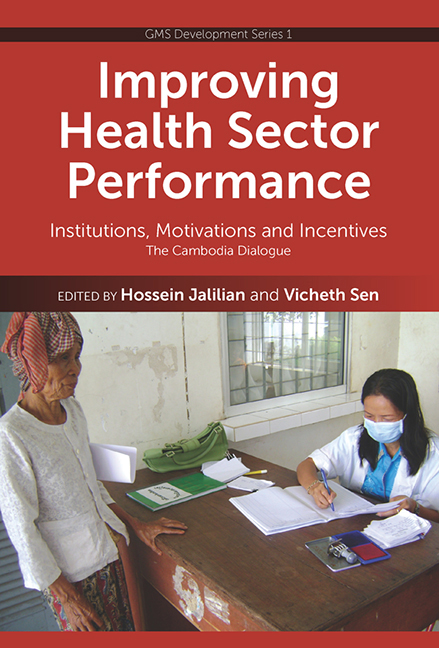 Improving Health Sector Performance
Improving Health Sector Performance Published online by Cambridge University Press: 21 October 2015
The Cambodian Government considers health as the heart of the Millennium Development Goals (MDGs) because healthy people constitute the basis for human resource development and sustainable socio-economic progress.
The chapters in this volume come from papers presented at an international conference organized by the Cambodia Development Resource Institute in April 2010. With participation from local and international experts, the conference aimed at collecting major experiences and innovative solutions from inside and outside the country to improve health sector performance, with particular focus on institutions, motivations and incentives.
The growing gap between the supply of health care professionals and the demand for their services is recognized as a key issue for health and development worldwide. The Cambodian National Strategic Plan for Health notes that in 2008, for every 10,000 members of the population there were only 0.10 physicians, 0.55 secondary midwives, and 1.21 secondary nurses.
This shortage of health human resources is becoming a high priority issue on the political agenda. The introduction of the Priority Operating Costs (POC) system in July 2010 will allow for the motivation of health care workers to deliver better public services. Within the framework of Cambodian ownership and leadership, this public administration reform aims at facilitating the harmonization and alignment of practices by development partners in this area. The general principles of POC aim at “management which is result-based with payments that are made against achievements”. It is further characterized as “a scheme which provides means to appointees to do their work efficiently in a spirit of ownership and leadership”.
The chapters in this volume deal with both an overview of the issues and with the four broad themes of the conference: the purchasing of health services; health worker contracts; managing doctors and nurses; and health service consumer behaviour.
Through the chapters and discussions, the conference offered a unique forum for policy makers, health officials, civil society organizations, United Nations agencies, and development partners to discuss with local and international researchers major issues concerning the performance of the health sector. The lessons drawn will enable Cambodia to plan and manage human resources in the health sector better and to address major issues of organization, motivations and incentives.
To save this book to your Kindle, first ensure no-reply@cambridge.org is added to your Approved Personal Document E-mail List under your Personal Document Settings on the Manage Your Content and Devices page of your Amazon account. Then enter the ‘name’ part of your Kindle email address below. Find out more about saving to your Kindle.
Note you can select to save to either the @free.kindle.com or @kindle.com variations. ‘@free.kindle.com’ emails are free but can only be saved to your device when it is connected to wi-fi. ‘@kindle.com’ emails can be delivered even when you are not connected to wi-fi, but note that service fees apply.
Find out more about the Kindle Personal Document Service.
To save content items to your account, please confirm that you agree to abide by our usage policies. If this is the first time you use this feature, you will be asked to authorise Cambridge Core to connect with your account. Find out more about saving content to Dropbox.
To save content items to your account, please confirm that you agree to abide by our usage policies. If this is the first time you use this feature, you will be asked to authorise Cambridge Core to connect with your account. Find out more about saving content to Google Drive.